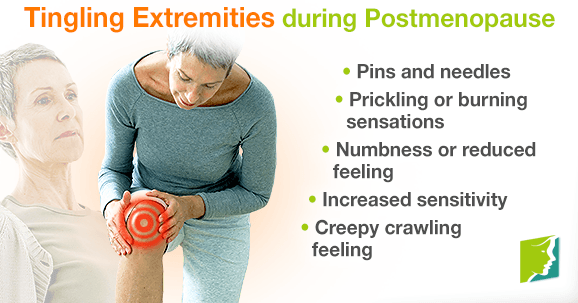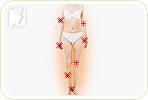Tingling extremities are not one of the most common symptoms of postmenopause, but they can nevertheless occur. Tingling can be unsettling and affect any area of the body, in particular the feet, legs, arms, and hands. Hormone changes are normally to blame for frequent tingling extremities and numbness, and they are rarely a sign of something serious. Nevertheless, many sufferers are curious about this symptom of postmenopause. Read on to discover more about tingling extremities during postmenopause.
Symptoms of Tingling Extremities
Each woman who suffers tingling extremities during postmenopause will have a different experience, mainly with regards to frequency and severity, but there are also a number of potential symptoms. Below are some of the most common symptoms of tingling extremities.
- Pins and needles
- Prickling or burning sensations
- Numbness or reduced feeling
- Increased sensitivity
- Creepy crawling feeling
When Do They Occur?
Tingling extremities can happen at any time and are often worsened by certain postures that pinch a nerve or press and artery. Most of the time, relieving the pressure on the affected body part is enough to get rid of the tingling sensation, but sometimes, the tingling can persist. If this happens for too long, or is accompanied by other symptoms, then it is important to see a doctor, as it could be indicative of a more serious condition. Below is more information about some of the common reasons for tingling extremities.
Causes of Tingling Extremities
During postmenopause, the tingling is most likely caused by a lack of estrogen production. After menopause, the body produces only very low levels of estrogen. This lack of estrogen obviously results in no menstrual cycle, but it can also have other effects on the body, especially the nervous system. This upsetting of the nervous system can sometimes produce odd sensations, like tingling.
As well as hormones, there are a number of medical conditions of which tingling extremities are a symptom. Some of these are:
- Migraines
- Multiple sclerosis
- Stroke
- Seizures
- Thyroid problems
- Hyperventilation
- Herniated disc
- Anxiety
- Carpal tunnel syndrome
- Diabetes
When to See a Doctor
Tingling extremities during postmenopause are most likely caused by the lack of estrogen, so they are not a cause for concern. However, there are some occasions when tingling might occur and a trip to the doctor is advisable:
- When accompanied by weakness or paralysis
- After a back, neck, or head injury
- If there is an inability to control the movement of an arm or leg
- Loss of bladder or bowel control
- If it prompts a loss of feeling
- If you have slurred speech
- If your vision changes
- If you have trouble walking
Tingling extremities during postmenopause are not common, but at the same time, they are not generally a cause for concern. If they are accompanied by any symptoms mentioned above, then medical attention should be sought, but if not, then herbal remedies should be enough to reduce the tingling.
Sources
- HLove, S. (2003). Dr. Susan Love's Menopause & Hormone Book. New York: Three Rivers Press.
- National Institutes of Health. (2013). Tingling and numbness. Retrieved December 11, 2014, from http://www.nlm.nih.gov/medlineplus/ency/article/003206.htm




